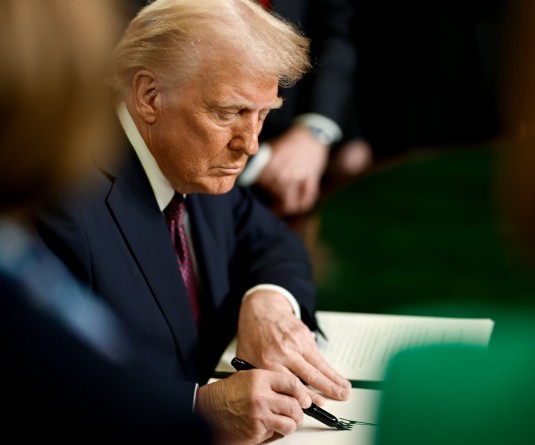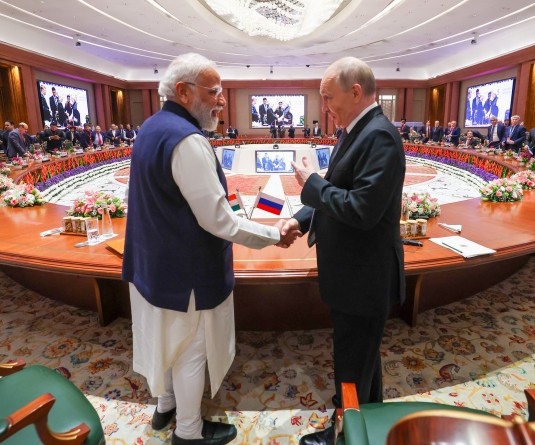
Members of the pro-Kremlin movement United Russia Young Guards lay flowers near a wreath outside the Libyan Embassy in Moscow, Russia on Wednesday, March 23. Written on the wreath: Condolences for Deceased. (AP Photo)
TRIPOLI, March 23 (Reuters): Western warplanes silenced Muammar Gaddafi's artillery and tanks besieging rebel-held Misrata in western Libya on Wednesday after a U.S. admiral warned his armor was the next target. Breathing defiance, Gaddafi earlier said Western powers who carried out a fourth night of air strikes on Libya to protect civilians under a U.N. mandate were "a bunch of fascists who will end up in the dustbin of history."
Gaddafi's tanks had kept up the shelling of Misrata, killing dozens of people this week, and residents said a "massacre" was taking place with doctors forced to treat the wounded in hospital corridors. Snipers fired at people from rooftops.
"The allied planes bombed twice so far. At 12:45 (6:45 p.m. ET Tuesday) this morning and then again less than two hours ago," a resident, Saadoun, told Reuters by telephone from Misrata. "They (pro-Gaddafi forces) haven't fired a single artillery (round) since the air strike."
At least two explosions were heard in the Libyan capital Tripoli before dawn on Wednesday on a fourth night of strikes, Reuters witnesses said. The roar of a warplane was heard above the city followed by a barrage of anti-aircraft gunfire. Prior to the Misrata strikes, Rear Admiral Peg Klein said warplanes would be sent out to attack Gaddafi's tanks.
"Some of those cities still have tanks advancing on them to attack the Libyan people," said Klein, commander of the expeditionary strike group aboard the USS Kearsarge off Libya. "We are authorized, and the president made the nexus between the Security Council resolution and what he considers our legal mandate to attack those tanks. So that is the type of target that our strike aircraft will go at."
While Western air power has grounded Gaddafi's warplanes and pushed back his forces from the brink of rebel stronghold Benghazi, his forces have been besieging Libyan holdouts by rebels fighting to overthrow his 41-year rule. In the east of this oil-producing north African desert state, disorganized and badly equipped rebels have failed to capitalize on air strikes and are pinned down. The fighters have been unable to dislodge Gaddafi's forces from the key junction of Ajdabiyah in the east bringing a big risk of stalemate on the ground, security analysts say.
"We will not surrender," Gaddafi had told supporters forming a human shield to protect him at his Tripoli compound, which came under attack in 1986 from the U.S. Reagan administration and once again in the current round of air strikes. "We will defeat them by any means ... We are ready for the fight, whether it will be a short or a long one ... We will be victorious in the end," he said in a live television broadcast, his first public appearance since the air strikes began.
The Libyan government denies its army is conducting any offensive operations and says troops are only defending themselves when they come under attack. The siege of Misrata, now weeks old, had become increasingly desperate, with water cut off for days and food running out, doctors operating on patients in hospital corridors and many of the wounded left untreated or simply turned away.
Gaddafi's tanks had kept up the shelling of Misrata, killing dozens of people this week, and residents said a "massacre" was taking place with doctors forced to treat the wounded in hospital corridors. Snipers fired at people from rooftops.
"The allied planes bombed twice so far. At 12:45 (6:45 p.m. ET Tuesday) this morning and then again less than two hours ago," a resident, Saadoun, told Reuters by telephone from Misrata. "They (pro-Gaddafi forces) haven't fired a single artillery (round) since the air strike."
At least two explosions were heard in the Libyan capital Tripoli before dawn on Wednesday on a fourth night of strikes, Reuters witnesses said. The roar of a warplane was heard above the city followed by a barrage of anti-aircraft gunfire. Prior to the Misrata strikes, Rear Admiral Peg Klein said warplanes would be sent out to attack Gaddafi's tanks.
"Some of those cities still have tanks advancing on them to attack the Libyan people," said Klein, commander of the expeditionary strike group aboard the USS Kearsarge off Libya. "We are authorized, and the president made the nexus between the Security Council resolution and what he considers our legal mandate to attack those tanks. So that is the type of target that our strike aircraft will go at."
While Western air power has grounded Gaddafi's warplanes and pushed back his forces from the brink of rebel stronghold Benghazi, his forces have been besieging Libyan holdouts by rebels fighting to overthrow his 41-year rule. In the east of this oil-producing north African desert state, disorganized and badly equipped rebels have failed to capitalize on air strikes and are pinned down. The fighters have been unable to dislodge Gaddafi's forces from the key junction of Ajdabiyah in the east bringing a big risk of stalemate on the ground, security analysts say.
"We will not surrender," Gaddafi had told supporters forming a human shield to protect him at his Tripoli compound, which came under attack in 1986 from the U.S. Reagan administration and once again in the current round of air strikes. "We will defeat them by any means ... We are ready for the fight, whether it will be a short or a long one ... We will be victorious in the end," he said in a live television broadcast, his first public appearance since the air strikes began.
The Libyan government denies its army is conducting any offensive operations and says troops are only defending themselves when they come under attack. The siege of Misrata, now weeks old, had become increasingly desperate, with water cut off for days and food running out, doctors operating on patients in hospital corridors and many of the wounded left untreated or simply turned away.
West will end up in “dustbin of history”: Gaddafi
TRIPOLI, March 23 (Reuters): Western powers attacking Libya will end up in the dustbin of history, Muammar Gaddafi said as an American admiral signaled a possible new phase in the air campaign could be attacks on his advancing tanks. Gaddafi's tanks have kept up the shelling of rebel-held Misrata in the west, killing dozens of people, and have attacked Zintan near the border with Tunisia despite a ceasefire announced by Libyan forces, residents and rebels say.
"Some of those cities still have tanks advancing on them to attack the Libyan people," said Rear Admiral Peg Klein, commander of the expeditionary strike group aboard the USS Kearsarge off Libya, adding: "We are authorized, and the president made the nexus between the Security Council resolution and what he considers our legal mandate to attack those tanks. So that is the type of target that our strike aircraft will go at."
Sami, a resident of Misrata, told Reuters by telephone on Wednesday: "The situation is relatively calm but snipers are still positioned on the rooftops of buildings." "We heard a sound this morning but we don't know if it was a bombardment by tanks or an explosion caused by air strikes."
While Western air power has grounded Gaddafi's warplanes and pushed back his forces from the brink of rebel stronghold Benghazi, his forces have been besieging Libyan holdouts by rebels fighting to overthrow his 41-year rule. At least two explosions were heard in the Libyan capital Tripoli before dawn on Wednesday on a fourth night of strikes, Reuters witnesses said. The roar of a warplane was heard above the city followed by a barrage of anti-aircraft gunfire. In the east of this oil-producing north African desert state, disorganized and badly equipped rebels failed to capitalize on air strikes and are pinned down. The fighters have been unable to dislodge Gaddafi's forces from the key junction of Ajdabiyah in the east bringing a big risk of stalemate on the ground, security analysts say.
"We will not surrender," Gaddafi earlier told supporters forming a human shield to protect him at his Tripoli compound, which came under attack in 1986 from the U.S. Reagan administration and once again in the current round of air strikes. "We will defeat them by any means ... We are ready for the fight, whether it will be a short or a long one ... We will be victorious in the end," he said in a live television broadcast, his first public appearance since the air strikes began.
"This assault ... is by a bunch of fascists who will end up in the dustbin of history," Gaddafi said in a speech followed by fireworks in the Libyan capital as crowds cheered and supporters fired guns into the air.
The Libyan government denies its army is conducting any offensive operations and says troops are only defending themselves when they come under attack. It was impossible to independently verify the reports. The siege of Misrata, now weeks old, is becoming increasingly desperate, with water cut off for days and food running out, doctors operating on patients in hospital corridors and many of the wounded left untreated or simply turned away.
"The situation in the local hospital is disastrous," said a Misrata doctor. "The doctors and medical teams are exhausted beyond human physical ability and some of them cannot reach the hospital because of tanks and snipers."
The rebel effort in the desert scrub of east Libya was bogged down outside Ajdabiyah, with no movement on the strategic town since Gaddafi's remaining tanks holed up there after the government's armored advance along the open road to Benghazi was blown to bits by French air strikes on Saturday night. Hiding in the sand dunes from the tank fire coming from the town, the rebels are without heavy weapons, leadership, communication, or even a plan.
On Tuesday, groups of fighters lounged around, chatting and smoking cigarettes. This was the spearhead of the counter-offensive. When asked who was in command, one fighter, Mohamed Bhreka, shrugged and said: "Nobody is. We are volunteers. We just come here. There is no plan."
"Some of those cities still have tanks advancing on them to attack the Libyan people," said Rear Admiral Peg Klein, commander of the expeditionary strike group aboard the USS Kearsarge off Libya, adding: "We are authorized, and the president made the nexus between the Security Council resolution and what he considers our legal mandate to attack those tanks. So that is the type of target that our strike aircraft will go at."
Sami, a resident of Misrata, told Reuters by telephone on Wednesday: "The situation is relatively calm but snipers are still positioned on the rooftops of buildings." "We heard a sound this morning but we don't know if it was a bombardment by tanks or an explosion caused by air strikes."
While Western air power has grounded Gaddafi's warplanes and pushed back his forces from the brink of rebel stronghold Benghazi, his forces have been besieging Libyan holdouts by rebels fighting to overthrow his 41-year rule. At least two explosions were heard in the Libyan capital Tripoli before dawn on Wednesday on a fourth night of strikes, Reuters witnesses said. The roar of a warplane was heard above the city followed by a barrage of anti-aircraft gunfire. In the east of this oil-producing north African desert state, disorganized and badly equipped rebels failed to capitalize on air strikes and are pinned down. The fighters have been unable to dislodge Gaddafi's forces from the key junction of Ajdabiyah in the east bringing a big risk of stalemate on the ground, security analysts say.
"We will not surrender," Gaddafi earlier told supporters forming a human shield to protect him at his Tripoli compound, which came under attack in 1986 from the U.S. Reagan administration and once again in the current round of air strikes. "We will defeat them by any means ... We are ready for the fight, whether it will be a short or a long one ... We will be victorious in the end," he said in a live television broadcast, his first public appearance since the air strikes began.
"This assault ... is by a bunch of fascists who will end up in the dustbin of history," Gaddafi said in a speech followed by fireworks in the Libyan capital as crowds cheered and supporters fired guns into the air.
The Libyan government denies its army is conducting any offensive operations and says troops are only defending themselves when they come under attack. It was impossible to independently verify the reports. The siege of Misrata, now weeks old, is becoming increasingly desperate, with water cut off for days and food running out, doctors operating on patients in hospital corridors and many of the wounded left untreated or simply turned away.
"The situation in the local hospital is disastrous," said a Misrata doctor. "The doctors and medical teams are exhausted beyond human physical ability and some of them cannot reach the hospital because of tanks and snipers."
The rebel effort in the desert scrub of east Libya was bogged down outside Ajdabiyah, with no movement on the strategic town since Gaddafi's remaining tanks holed up there after the government's armored advance along the open road to Benghazi was blown to bits by French air strikes on Saturday night. Hiding in the sand dunes from the tank fire coming from the town, the rebels are without heavy weapons, leadership, communication, or even a plan.
On Tuesday, groups of fighters lounged around, chatting and smoking cigarettes. This was the spearhead of the counter-offensive. When asked who was in command, one fighter, Mohamed Bhreka, shrugged and said: "Nobody is. We are volunteers. We just come here. There is no plan."
Yemeni parliamen
t gives president emergency powers
SANAA, March 23 (AP): Yemen's parliament enacted sweeping emergency laws Wednesday after the country's embattled president asked for new powers of arrest, detention and censorship to quash a popular uprising demanding his ouster. The move escalates the showdown between U.S.-backed leader Ali Abdullah Saleh and the movement that has unified military commanders, religious leaders and protesting youth in demands for his immediate departure. The law suspends the constitution, allows media censorship, bars street protests and gives security forces 30 days of far-reaching powers to arrest and detain suspects without judicial process.
Its adoption was a virtual certainty because Saleh's ruling party dominates the 301-seat legislature. Opposition and independent legislators stayed away from Wednesday's parliamentary session along with dozens of lawmakers from Saleh's own ruling party. Parliament said more than 160 lawmakers were present Wednesday. There was no breakdown available of the vote, which was done by a show of hands amid chaotic scenes. Youth leaders at the Sanaa square that has become the epicenter of the protests dismissed the move.
"It is the revolution that now decides the future of the nation," said Jamal Anaam, one of the protests' leaders. We pay no attention to the measures." The accelerating conflict has raised fears that Yemen could be pushed into even greater instability.
SANAA, March 23 (AP): Yemen's parliament enacted sweeping emergency laws Wednesday after the country's embattled president asked for new powers of arrest, detention and censorship to quash a popular uprising demanding his ouster. The move escalates the showdown between U.S.-backed leader Ali Abdullah Saleh and the movement that has unified military commanders, religious leaders and protesting youth in demands for his immediate departure. The law suspends the constitution, allows media censorship, bars street protests and gives security forces 30 days of far-reaching powers to arrest and detain suspects without judicial process.
Its adoption was a virtual certainty because Saleh's ruling party dominates the 301-seat legislature. Opposition and independent legislators stayed away from Wednesday's parliamentary session along with dozens of lawmakers from Saleh's own ruling party. Parliament said more than 160 lawmakers were present Wednesday. There was no breakdown available of the vote, which was done by a show of hands amid chaotic scenes. Youth leaders at the Sanaa square that has become the epicenter of the protests dismissed the move.
"It is the revolution that now decides the future of the nation," said Jamal Anaam, one of the protests' leaders. We pay no attention to the measures." The accelerating conflict has raised fears that Yemen could be pushed into even greater instability.






